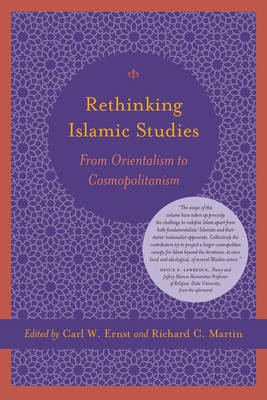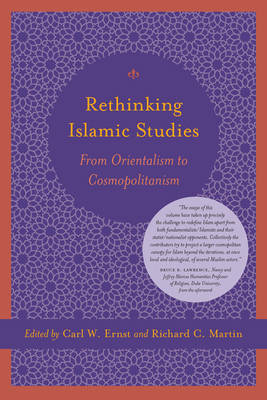
Bedankt voor het vertrouwen het afgelopen jaar! Om jou te bedanken bieden we GRATIS verzending (in België) aan op alles gedurende de hele maand januari.
- Afhalen na 1 uur in een winkel met voorraad
- In januari gratis thuislevering in België
- Ruim aanbod met 7 miljoen producten
Bedankt voor het vertrouwen het afgelopen jaar! Om jou te bedanken bieden we GRATIS verzending (in België) aan op alles gedurende de hele maand januari.
- Afhalen na 1 uur in een winkel met voorraad
- In januari gratis thuislevering in België
- Ruim aanbod met 7 miljoen producten
Zoeken
Rethinking Islam Studies
From Orientalism to Cosmopolitanism
€ 64,45
+ 128 punten
Omschrijving
Rethinking Islamic Studies upends scholarly roadblocks in post-Orientalist discourse within contemporary Islamic studies and carves fresh inroads toward a robust new understanding of the discipline, one that includes religious studies and other politically infused fields of inquiry. Editors Carl W. Ernst and Richard C. Martin, along with a distinguished group of scholars, map the trajectory of the study of Islam and offer innovative approaches to the theoretical and methodological frameworks that have traditionally dominated the field. In the volume's first section, the contributors reexamine the underlying notions of modernity in the East and West and allow for the possibility of multiple and incongruent modernities. This opens a discussion of fundamentalism as a manifestation of the tensions of modernity on Muslim cultures. The second section addresses the volatile character of Islamic religious identity as expressed in religious and political movements at national and local levels. In the third section, contributors focus on Muslim communities in Asia and examine the formation of religious models and concepts as they appear in this region. This study concludes with an afterword by accomplished Islamic studies scholar Bruce B. Lawrence reflecting on the evolution of this post-Orientalist approach to Islam and placing the volume within existing and emerging scholarship.
Specificaties
Betrokkenen
- Uitgeverij:
Inhoud
- Aantal bladzijden:
- 344
- Taal:
- Engels
- Reeks:
Eigenschappen
- Productcode (EAN):
- 9781570038938
- Verschijningsdatum:
- 1/05/2010
- Uitvoering:
- Paperback
- Formaat:
- Trade paperback (VS)
- Afmetingen:
- 152 mm x 229 mm
- Gewicht:
- 503 g

Alleen bij Standaard Boekhandel
+ 128 punten op je klantenkaart van Standaard Boekhandel
Beoordelingen
We publiceren alleen reviews die voldoen aan de voorwaarden voor reviews. Bekijk onze voorwaarden voor reviews.








